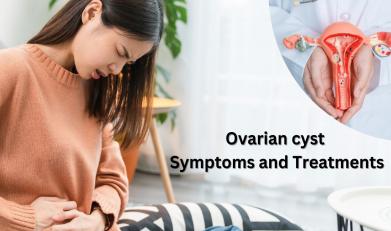

13 Jun, 2024
Ovarian cysts are fluid-filled sacs that develop on or within an ovary. While most ovarian cysts are benign and asymptomatic, some can cause significant discomfort and health issues. Understanding the symptoms and treatment options is crucial for managing this common gynecological condition.
Ovarian cysts are a normal part of the menstrual cycle and often resolve on their own without causing any symptoms. They are categorized into two main types:
Functional Cysts: These cysts are related to the menstrual cycle and typically harmless. They include:
Follicular Cysts: Form when the follicle (sac) does not release an egg and continues to grow.
Corpus Luteum Cysts: Develop when the follicle releases an egg but accumulates fluid instead of breaking down.
Pathological Cysts: These cysts are not related to the menstrual cycle and can be either benign or malignant. They include:
Dermoid Cysts: Contain tissue such as hair, skin, or teeth.
Endometriomas: Caused by endometriosis, where uterine lining tissue grows outside the uterus.
Pelvic Pain: A dull or sharp pain in the lower abdomen on the side of the cyst. Pain may be intermittent or persistent.
Bloating and Swelling: An enlarged abdomen due to the size of the cyst.
Menstrual Irregularities: Unusual bleeding, heavier or lighter periods, or irregular cycles.
Painful Intercourse: Discomfort during sexual activity.
Frequent Urination: Pressure on the bladder causing a frequent need to urinate.
Digestive Issues: Nausea, vomiting, or constipation .
Pain Relievers: Over-the-counter painkillers for symptom management.
Laparoscopy: Minimally invasive removal of cysts, suitable for smaller, benign cysts.
Laparotomy:For larger or potentially malignant cysts, a more extensive surgery with a larger incision.
Oophorectomy: Removal of one or both ovaries if necessary, typically reserved for severe cases or cancer.
Preventive Measures
While it's not always possible to prevent ovarian cysts, certain lifestyle changes can reduce the risk:
Regular Pelvic Exams: Early detection through routine check-ups.
Manage Menstrual Irregularities: Using hormonal contraceptives under medical guidance.
Healthy Lifestyle: Balanced diet and regular exercise to maintain overall health.
Ovarian cysts are a common gynecological issue, often benign and self-resolving. However, awareness of symptoms and timely medical intervention is crucial to manage potential complications effectively. If you experience any concerning symptoms, consult your healthcare provider for proper diagnosis and treatment. Regular check-ups and a healthy lifestyle can help maintain ovarian health and overall well-being.